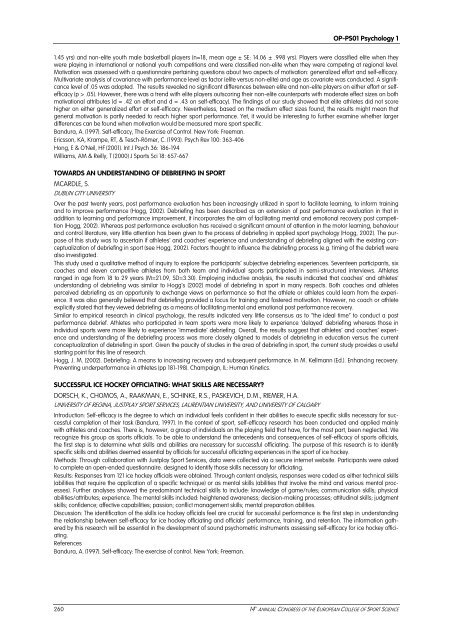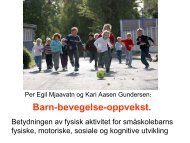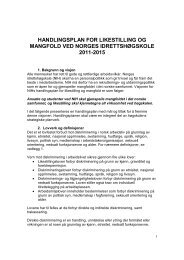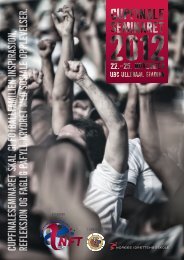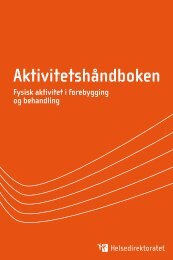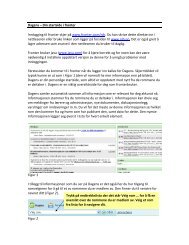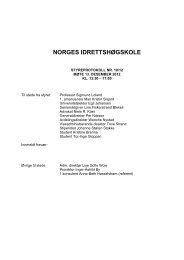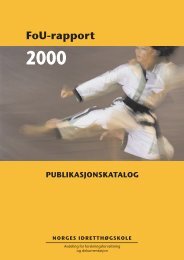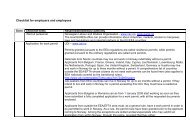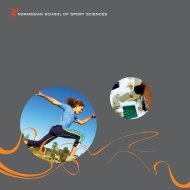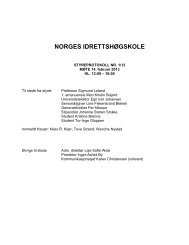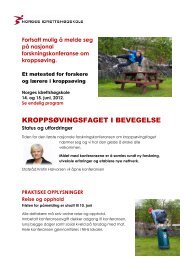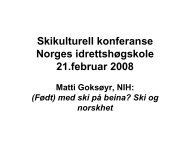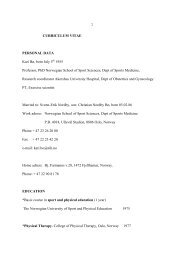- Page 1 and 2:
14 th annual Congress of the EUROPE
- Page 3 and 4:
Organisation Congress President - S
- Page 5 and 6:
Welcome On behalf of The European C
- Page 7 and 8:
Table of Contents IS-SS03 PERFORMIN
- Page 9 and 10:
Table of Contents PP-BM04 BIOMECHAN
- Page 11 and 12:
Table of Contents AUTHORS INDEX ...
- Page 13 and 14:
Wednesday, June 24th, 2009 isolatio
- Page 15 and 16:
Wednesday, June 24th, 2009 absolute
- Page 17 and 18:
Wednesday, June 24th, 2009 been per
- Page 19 and 20:
Wednesday, June 24th, 2009 13:00 -
- Page 21 and 22:
Wednesday, June 24th, 2009 HEART RA
- Page 23 and 24:
Wednesday, June 24th, 2009 13:00 -
- Page 25 and 26:
Wednesday, June 24th, 2009 MRF RESP
- Page 27 and 28:
Wednesday, June 24th, 2009 8-12 min
- Page 29 and 30:
Wednesday, June 24th, 2009 Fukuda,
- Page 31 and 32:
Wednesday, June 24th, 2009 Hasegawa
- Page 33 and 34:
Wednesday, June 24th, 2009 MIDGLEY,
- Page 35 and 36:
Wednesday, June 24th, 2009 Discussi
- Page 37 and 38:
Wednesday, June 24th, 2009 conducte
- Page 39 and 40:
Wednesday, June 24th, 2009 individu
- Page 41 and 42:
Wednesday, June 24th, 2009 an indiv
- Page 43 and 44:
Wednesday, June 24th, 2009 course,t
- Page 45 and 46:
Wednesday, June 24th, 2009 13:00 -
- Page 47 and 48:
Wednesday, June 24th, 2009 VO2tau a
- Page 49 and 50:
Wednesday, June 24th, 2009 3: a dis
- Page 51 and 52:
Wednesday, June 24th, 2009 Spertus
- Page 53 and 54:
Wednesday, June 24th, 2009 SPACE-TI
- Page 55 and 56:
Wednesday, June 24th, 2009 tance of
- Page 57 and 58:
Wednesday, June 24th, 2009 Relevanc
- Page 59 and 60:
Wednesday, June 24th, 2009 consider
- Page 61 and 62:
Wednesday, June 24th, 2009 COMPARAT
- Page 63 and 64:
Wednesday, June 24th, 2009 incremen
- Page 65 and 66:
Wednesday, June 24th, 2009 Chiodo S
- Page 67 and 68:
Wednesday, June 24th, 2009 mawashi
- Page 69 and 70:
Wednesday, June 24th, 2009 STRESS A
- Page 71 and 72:
Wednesday, June 24th, 2009 DIFFEREN
- Page 73 and 74:
Wednesday, June 24th, 2009 Results:
- Page 75 and 76:
Wednesday, June 24th, 2009 EFFECT O
- Page 77 and 78:
Wednesday, June 24th, 2009 experien
- Page 79 and 80:
Wednesday, June 24th, 2009 Lefévre
- Page 81 and 82:
Wednesday, June 24th, 2009 of the v
- Page 83 and 84:
Wednesday, June 24th, 2009 sion (p0
- Page 85 and 86:
Wednesday, June 24th, 2009 Conclusi
- Page 87 and 88:
Wednesday, June 24th, 2009 SUSTAINE
- Page 89 and 90:
Wednesday, June 24th, 2009 clinical
- Page 91 and 92:
Wednesday, June 24th, 2009 Results:
- Page 93 and 94:
Wednesday, June 24th, 2009 IMPROVEM
- Page 95 and 96:
Wednesday, June 24th, 2009 with fol
- Page 97 and 98:
Wednesday, June 24th, 2009 14:00 -
- Page 99 and 100:
Wednesday, June 24th, 2009 eration.
- Page 101 and 102:
Wednesday, June 24th, 2009 THE EFFE
- Page 103 and 104:
Wednesday, June 24th, 2009 skeletal
- Page 105 and 106:
Wednesday, June 24th, 2009 coeffici
- Page 107 and 108:
Wednesday, June 24th, 2009 McMahon
- Page 109 and 110:
Thursday, June 25th, 2009 Thursday,
- Page 111 and 112:
Thursday, June 25th, 2009 Hu G, Qia
- Page 113 and 114:
Thursday, June 25th, 2009 Discussio
- Page 115 and 116:
Thursday, June 25th, 2009 entertain
- Page 117 and 118:
Thursday, June 25th, 2009 (HRR60s),
- Page 119 and 120:
Thursday, June 25th, 2009 evidence
- Page 121 and 122:
Thursday, June 25th, 2009 dilatatio
- Page 123 and 124:
Thursday, June 25th, 2009 08:30 - 1
- Page 125 and 126:
Thursday, June 25th, 2009 fibers).
- Page 127 and 128:
Thursday, June 25th, 2009 describin
- Page 129 and 130:
Thursday, June 25th, 2009 biosynthe
- Page 131 and 132:
Thursday, June 25th, 2009 10:15 - 1
- Page 133 and 134:
Thursday, June 25th, 2009 EVALUATIO
- Page 135 and 136:
Thursday, June 25th, 2009 Gladden,
- Page 137 and 138:
Thursday, June 25th, 2009 EXERCISE
- Page 139 and 140:
Thursday, June 25th, 2009 MOTIVATIO
- Page 141 and 142:
Thursday, June 25th, 2009 Whereas t
- Page 143 and 144:
Thursday, June 25th, 2009 10:15 - 1
- Page 145 and 146:
Thursday, June 25th, 2009 Sixteen y
- Page 147 and 148:
Thursday, June 25th, 2009 LACTATE R
- Page 149 and 150:
Thursday, June 25th, 2009 dPT value
- Page 151 and 152:
Thursday, June 25th, 2009 and polar
- Page 153 and 154:
Thursday, June 25th, 2009 HOW TO CA
- Page 155 and 156:
Thursday, June 25th, 2009 ACUTE EFF
- Page 157 and 158:
Thursday, June 25th, 2009 EFFECTS O
- Page 159 and 160:
Thursday, June 25th, 2009 model ind
- Page 161 and 162:
Thursday, June 25th, 2009 PEAK OXYG
- Page 163 and 164:
Thursday, June 25th, 2009 Results :
- Page 165 and 166:
Thursday, June 25th, 2009 achieve o
- Page 167 and 168:
Thursday, June 25th, 2009 Discussio
- Page 169 and 170:
Thursday, June 25th, 2009 Meile, W.
- Page 171 and 172:
Thursday, June 25th, 2009 crease of
- Page 173 and 174:
Thursday, June 25th, 2009 Backgroun
- Page 175 and 176:
Thursday, June 25th, 2009 CHARACTER
- Page 177 and 178:
Thursday, June 25th, 2009 sides, Th
- Page 179 and 180:
Thursday, June 25th, 2009 differ si
- Page 181 and 182:
Thursday, June 25th, 2009 Two studi
- Page 183 and 184:
Thursday, June 25th, 2009 14:15 - 1
- Page 185 and 186:
Thursday, June 25th, 2009 14:15 - 1
- Page 187 and 188:
Thursday, June 25th, 2009 letes. Es
- Page 189 and 190:
Thursday, June 25th, 2009 CONCLUSIO
- Page 191 and 192:
Thursday, June 25th, 2009 content.
- Page 193 and 194:
Thursday, June 25th, 2009 Discussio
- Page 195 and 196:
Thursday, June 25th, 2009 the chang
- Page 197 and 198:
Thursday, June 25th, 2009 certain d
- Page 199 and 200:
Thursday, June 25th, 2009 However,
- Page 201 and 202:
Thursday, June 25th, 2009 in identi
- Page 203 and 204:
Thursday, June 25th, 2009 changes i
- Page 205 and 206:
Thursday, June 25th, 2009 analyze t
- Page 207 and 208:
Thursday, June 25th, 2009 good stre
- Page 209 and 210: Thursday, June 25th, 2009 motivatio
- Page 211 and 212: Thursday, June 25th, 2009 sample do
- Page 213 and 214: Thursday, June 25th, 2009 14:15 - 1
- Page 215 and 216: Thursday, June 25th, 2009 Results:
- Page 217 and 218: Thursday, June 25th, 2009 THE DEPLE
- Page 219 and 220: Thursday, June 25th, 2009 ous after
- Page 221 and 222: Thursday, June 25th, 2009 Results:
- Page 223 and 224: Thursday, June 25th, 2009 Method: M
- Page 225 and 226: Thursday, June 25th, 2009 Lukaski,
- Page 227 and 228: Thursday, June 25th, 2009 original
- Page 229 and 230: Thursday, June 25th, 2009 weight re
- Page 231 and 232: Thursday, June 25th, 2009 THE ’4
- Page 233 and 234: Thursday, June 25th, 2009 COGNITION
- Page 235 and 236: Thursday, June 25th, 2009 RESULTS :
- Page 237 and 238: Thursday, June 25th, 2009 4TH GRADE
- Page 239 and 240: Thursday, June 25th, 2009 Mittag W,
- Page 241 and 242: Thursday, June 25th, 2009 Discussio
- Page 243 and 244: Thursday, June 25th, 2009 useful to
- Page 245 and 246: Thursday, June 25th, 2009 if stress
- Page 247 and 248: Thursday, June 25th, 2009 In sequen
- Page 249 and 250: Thursday, June 25th, 2009 NON-LINEA
- Page 251 and 252: Thursday, June 25th, 2009 COMPARISO
- Page 253 and 254: Thursday, June 25th, 2009 2 Faculty
- Page 255 and 256: Thursday, June 25th, 2009 DOES PREC
- Page 257 and 258: Thursday, June 25th, 2009 mean head
- Page 259: Thursday, June 25th, 2009 the Medit
- Page 263 and 264: Thursday, June 25th, 2009 THE IMPAC
- Page 265 and 266: Thursday, June 25th, 2009 15:15 - 1
- Page 267 and 268: Thursday, June 25th, 2009 reflected
- Page 269 and 270: Thursday, June 25th, 2009 THE EFECT
- Page 271 and 272: Thursday, June 25th, 2009 MUSCLE FA
- Page 273 and 274: Thursday, June 25th, 2009 mated mal
- Page 275 and 276: Thursday, June 25th, 2009 logical s
- Page 277 and 278: Thursday, June 25th, 2009 Eight hea
- Page 279 and 280: Thursday, June 25th, 2009 THE RATE
- Page 281 and 282: Thursday, June 25th, 2009 Our data
- Page 283 and 284: Thursday, June 25th, 2009 IDENTIFYI
- Page 285 and 286: Thursday, June 25th, 2009 17:15 - 1
- Page 287 and 288: Thursday, June 25th, 2009 handicap
- Page 289 and 290: Thursday, June 25th, 2009 High pain
- Page 291 and 292: Thursday, June 25th, 2009 of childr
- Page 293 and 294: Thursday, June 25th, 2009 present n
- Page 295 and 296: Thursday, June 25th, 2009 ing sessi
- Page 297 and 298: Thursday, June 25th, 2009 Methods:
- Page 299 and 300: Thursday, June 25th, 2009 muscle fi
- Page 301 and 302: Thursday, June 25th, 2009 BRONCHIAL
- Page 303 and 304: Thursday, June 25th, 2009 We conclu
- Page 305 and 306: Friday, June 26th, 2009 Sternberg,
- Page 307 and 308: Friday, June 26th, 2009 during the
- Page 309 and 310: Friday, June 26th, 2009 broader soc
- Page 311 and 312:
Friday, June 26th, 2009 Continuous
- Page 313 and 314:
Friday, June 26th, 2009 FOLLOW UP O
- Page 315 and 316:
Friday, June 26th, 2009 08:30 - 10:
- Page 317 and 318:
Friday, June 26th, 2009 KENYAN DOMI
- Page 319 and 320:
Friday, June 26th, 2009 EFFECT OF C
- Page 321 and 322:
Friday, June 26th, 2009 08:30 - 10:
- Page 323 and 324:
Friday, June 26th, 2009 describing
- Page 325 and 326:
Friday, June 26th, 2009 This work w
- Page 327 and 328:
Friday, June 26th, 2009 1. Bhasin E
- Page 329 and 330:
Friday, June 26th, 2009 BISS is a s
- Page 331 and 332:
Friday, June 26th, 2009 A COMPARISO
- Page 333 and 334:
Friday, June 26th, 2009 nation, str
- Page 335 and 336:
Friday, June 26th, 2009 total knee
- Page 337 and 338:
Friday, June 26th, 2009 BENEFITS OF
- Page 339 and 340:
Friday, June 26th, 2009 indicate a
- Page 341 and 342:
Friday, June 26th, 2009 IMMUNOFLUOR
- Page 343 and 344:
Friday, June 26th, 2009 either high
- Page 345 and 346:
Friday, June 26th, 2009 References
- Page 347 and 348:
Friday, June 26th, 2009 12:00 - 13:
- Page 349 and 350:
Friday, June 26th, 2009 suggested t
- Page 351 and 352:
Friday, June 26th, 2009 THE EFFECT
- Page 353 and 354:
Friday, June 26th, 2009 were measur
- Page 355 and 356:
Friday, June 26th, 2009 Mayer, T.,
- Page 357 and 358:
Friday, June 26th, 2009 39 untraine
- Page 359 and 360:
Friday, June 26th, 2009 We showed t
- Page 361 and 362:
Friday, June 26th, 2009 14:15 - 15:
- Page 363 and 364:
Friday, June 26th, 2009 nation. The
- Page 365 and 366:
Friday, June 26th, 2009 Subjects: t
- Page 367 and 368:
Friday, June 26th, 2009 Method: Eig
- Page 369 and 370:
Friday, June 26th, 2009 14:15 - 15:
- Page 371 and 372:
Friday, June 26th, 2009 with a posi
- Page 373 and 374:
Friday, June 26th, 2009 ENDURANCE E
- Page 375 and 376:
Friday, June 26th, 2009 IL-4, IL-6,
- Page 377 and 378:
Friday, June 26th, 2009 THE JUSTIFI
- Page 379 and 380:
Friday, June 26th, 2009 water exerc
- Page 381 and 382:
Friday, June 26th, 2009 Tisdale MJ.
- Page 383 and 384:
Friday, June 26th, 2009 Lira FS, Ta
- Page 385 and 386:
Friday, June 26th, 2009 days assumi
- Page 387 and 388:
Friday, June 26th, 2009 obtained fr
- Page 389 and 390:
Friday, June 26th, 2009 Colella D e
- Page 391 and 392:
Friday, June 26th, 2009 Results: Tw
- Page 393 and 394:
Friday, June 26th, 2009 PHYSICAL AC
- Page 395 and 396:
Friday, June 26th, 2009 Discussion:
- Page 397 and 398:
Friday, June 26th, 2009 14:15 - 15:
- Page 399 and 400:
Friday, June 26th, 2009 Conclusions
- Page 401 and 402:
Friday, June 26th, 2009 14:15 - 15:
- Page 403 and 404:
Friday, June 26th, 2009 LATERAL SPE
- Page 405 and 406:
Friday, June 26th, 2009 curve (iT),
- Page 407 and 408:
Friday, June 26th, 2009 Body weight
- Page 409 and 410:
Friday, June 26th, 2009 METHODS OF
- Page 411 and 412:
Friday, June 26th, 2009 FIRST RESUL
- Page 413 and 414:
Friday, June 26th, 2009 JS and JF w
- Page 415 and 416:
Friday, June 26th, 2009 Methods: To
- Page 417 and 418:
Friday, June 26th, 2009 • Bandura
- Page 419 and 420:
Friday, June 26th, 2009 pared to le
- Page 421 and 422:
Friday, June 26th, 2009 HORSE-RIDIN
- Page 423 and 424:
Friday, June 26th, 2009 COMPLEMENTA
- Page 425 and 426:
Friday, June 26th, 2009 14:15 - 15:
- Page 427 and 428:
Friday, June 26th, 2009 stroke at 9
- Page 429 and 430:
Friday, June 26th, 2009 years). For
- Page 431 and 432:
Friday, June 26th, 2009 LACTATE AND
- Page 433 and 434:
Friday, June 26th, 2009 THE RELATIO
- Page 435 and 436:
Friday, June 26th, 2009 showed that
- Page 437 and 438:
Friday, June 26th, 2009 condition w
- Page 439 and 440:
Friday, June 26th, 2009 TIME TO EXH
- Page 441 and 442:
Friday, June 26th, 2009 The results
- Page 443 and 444:
Friday, June 26th, 2009 [2] Del Mon
- Page 445 and 446:
Friday, June 26th, 2009 Conclusions
- Page 447 and 448:
Friday, June 26th, 2009 The aim of
- Page 449 and 450:
Friday, June 26th, 2009 3) POKORN,
- Page 451 and 452:
Friday, June 26th, 2009 14:15 - 15:
- Page 453 and 454:
Friday, June 26th, 2009 adjustment
- Page 455 and 456:
Friday, June 26th, 2009 was evaluat
- Page 457 and 458:
Friday, June 26th, 2009 their actio
- Page 459 and 460:
Friday, June 26th, 2009 The main ob
- Page 461 and 462:
Friday, June 26th, 2009 Discussion:
- Page 463 and 464:
Friday, June 26th, 2009 et al., 199
- Page 465 and 466:
Friday, June 26th, 2009 chemistry,
- Page 467 and 468:
Friday, June 26th, 2009 15:15 - 16:
- Page 469 and 470:
Friday, June 26th, 2009 15:15 - 16:
- Page 471 and 472:
Friday, June 26th, 2009 ELECTROMYOG
- Page 473 and 474:
Friday, June 26th, 2009 THE MELATON
- Page 475 and 476:
Friday, June 26th, 2009 GENDER DIFF
- Page 477 and 478:
Friday, June 26th, 2009 Savulescu,
- Page 479 and 480:
Friday, June 26th, 2009 Moget, P &
- Page 481 and 482:
Friday, June 26th, 2009 implicit in
- Page 483 and 484:
Friday, June 26th, 2009 Maykut, P.,
- Page 485 and 486:
Friday, June 26th, 2009 Methods: Th
- Page 487 and 488:
Friday, June 26th, 2009 Discussion:
- Page 489 and 490:
Friday, June 26th, 2009 17:15 - 18:
- Page 491 and 492:
Friday, June 26th, 2009 FASTER PLAY
- Page 493 and 494:
Friday, June 26th, 2009 EFFECTS OF
- Page 495 and 496:
Friday, June 26th, 2009 separately.
- Page 497 and 498:
Friday, June 26th, 2009 EFFECTS OF
- Page 499 and 500:
Saturday, June 27th, 2009 Scheiber
- Page 501 and 502:
Saturday, June 27th, 2009 the inten
- Page 503 and 504:
Saturday, June 27th, 2009 08:30 - 1
- Page 505 and 506:
Saturday, June 27th, 2009 nomic ner
- Page 507 and 508:
Saturday, June 27th, 2009 DUE TO TH
- Page 509 and 510:
Saturday, June 27th, 2009 tations,
- Page 511 and 512:
Saturday, June 27th, 2009 08:30 - 1
- Page 513 and 514:
Saturday, June 27th, 2009 activity
- Page 515 and 516:
Saturday, June 27th, 2009 In Experi
- Page 517 and 518:
Saturday, June 27th, 2009 The prese
- Page 519 and 520:
Saturday, June 27th, 2009 Kohler G
- Page 521 and 522:
Saturday, June 27th, 2009 10:15 - 1
- Page 523 and 524:
Saturday, June 27th, 2009 Results:
- Page 525 and 526:
Saturday, June 27th, 2009 after A4.
- Page 527 and 528:
Saturday, June 27th, 2009 Reference
- Page 529 and 530:
Saturday, June 27th, 2009 The resul
- Page 531 and 532:
Saturday, June 27th, 2009 Through s
- Page 533 and 534:
Saturday, June 27th, 2009 HOW DOSE
- Page 535 and 536:
Saturday, June 27th, 2009 a more re
- Page 537 and 538:
Saturday, June 27th, 2009 THE KINET
- Page 539 and 540:
Saturday, June 27th, 2009 and the i
- Page 541 and 542:
Saturday, June 27th, 2009 cyclists
- Page 543 and 544:
Saturday, June 27th, 2009 using an
- Page 545 and 546:
Saturday, June 27th, 2009 Andersen,
- Page 547 and 548:
Saturday, June 27th, 2009 Sixteen h
- Page 549 and 550:
Saturday, June 27th, 2009 Methods:
- Page 551 and 552:
Saturday, June 27th, 2009 P.D. Tomp
- Page 553 and 554:
Saturday, June 27th, 2009 Methods:
- Page 555 and 556:
Saturday, June 27th, 2009 EFFECT OF
- Page 557 and 558:
Saturday, June 27th, 2009 counterpa
- Page 559 and 560:
Saturday, June 27th, 2009 Discussio
- Page 561 and 562:
Saturday, June 27th, 2009 REFERENCE
- Page 563 and 564:
Saturday, June 27th, 2009 Results:
- Page 565 and 566:
Saturday, June 27th, 2009 Discussio
- Page 567 and 568:
Saturday, June 27th, 2009 between v
- Page 569 and 570:
Saturday, June 27th, 2009 Roche AF,
- Page 571 and 572:
Saturday, June 27th, 2009 Departmen
- Page 573 and 574:
Saturday, June 27th, 2009 OPTIMISAT
- Page 575 and 576:
Saturday, June 27th, 2009 Results:
- Page 577 and 578:
Saturday, June 27th, 2009 applicati
- Page 579 and 580:
Saturday, June 27th, 2009 Cortical
- Page 581 and 582:
Saturday, June 27th, 2009 THE RELAT
- Page 583 and 584:
Saturday, June 27th, 2009 among pre
- Page 585 and 586:
Saturday, June 27th, 2009 Sheppard
- Page 587 and 588:
Saturday, June 27th, 2009 except fo
- Page 589 and 590:
Saturday, June 27th, 2009 n=10) did
- Page 591 and 592:
Saturday, June 27th, 2009 14:15 - 1
- Page 593 and 594:
Saturday, June 27th, 2009 2. Borran
- Page 595 and 596:
Saturday, June 27th, 2009 14:15 - 1
- Page 597 and 598:
Saturday, June 27th, 2009 diabetic,
- Page 599 and 600:
Saturday, June 27th, 2009 14:15 - 1
- Page 601 and 602:
Saturday, June 27th, 2009 SD±0.59
- Page 603 and 604:
Saturday, June 27th, 2009 Results:
- Page 605 and 606:
Saturday, June 27th, 2009 petitors)
- Page 607 and 608:
Saturday, June 27th, 2009 Luo J, Mc
- Page 609 and 610:
Saturday, June 27th, 2009 Results a
- Page 611 and 612:
Saturday, June 27th, 2009 IMPROVED
- Page 613 and 614:
Saturday, June 27th, 2009 THE EFFEC
- Page 615 and 616:
Saturday, June 27th, 2009 contribut
- Page 617 and 618:
Saturday, June 27th, 2009 board tha
- Page 619 and 620:
Saturday, June 27th, 2009 The techn
- Page 621 and 622:
Saturday, June 27th, 2009 Mujika I,
- Page 623 and 624:
Saturday, June 27th, 2009 respectiv
- Page 625 and 626:
Saturday, June 27th, 2009 and was c
- Page 627 and 628:
Saturday, June 27th, 2009 Thirty fe
- Page 629 and 630:
Saturday, June 27th, 2009 Dugan EL,
- Page 631 and 632:
Saturday, June 27th, 2009 ENERGY EX
- Page 633 and 634:
Saturday, June 27th, 2009 Chung CK,
- Page 635 and 636:
Saturday, June 27th, 2009 Discussio
- Page 637 and 638:
Saturday, June 27th, 2009 integrati
- Page 639 and 640:
Saturday, June 27th, 2009 ment. It
- Page 641 and 642:
Authors index ANNA, A..............
- Page 643 and 644:
Authors index BRISSWALTER, J. .....
- Page 645 and 646:
Authors index D D ELIA, F..........
- Page 647 and 648:
Authors index FERES, A.............
- Page 649 and 650:
Authors index GRENIER, J. .........
- Page 651 and 652:
Authors index IBAÑEZ, J. .........
- Page 653 and 654:
Authors index KISHI, Y. ...........
- Page 655 and 656:
Authors index LEWIS, N.C.S. .......
- Page 657 and 658:
Authors index MENDIGUCHÍA, J......
- Page 659 and 660:
Authors index NOBORU, T............
- Page 661 and 662:
Authors index PODLOG, L............
- Page 663 and 664:
Authors index SAKAI, T.............
- Page 665 and 666:
Authors index SMITH, R.S. .........
- Page 667 and 668:
Authors index TORDI, N. ...........
- Page 669:
Authors index WILLERSLEV-OLSEN, M..


